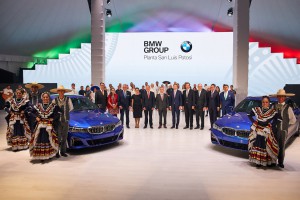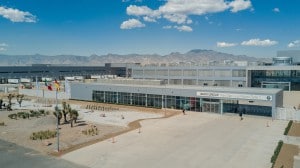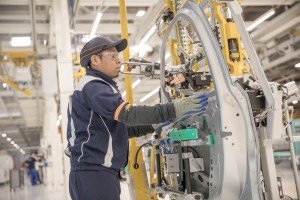
Amid the turmoil about U.S. tariffs on Mexican made goods, the BMW Group dedicated its newest assembly plant in San Luis Potosi, Mexico.
“The new plant in San Luis Potosi is an important pillar of the BMW Group’s global production strategy. We aim to achieve a balance in our production and sales in the different world regions,” Oliver Zipse, member of the Board of Management of BMW AG responsible for Production, said during the ceremony.

“We want to strengthen our footprint in important and growing markets. San Luis Potosi will significantly boost our regional production flexibility in the Americas. From here, we are delivering our locally produced BMW 3 Series sedan to customers worldwide.”
Even as Zipse spoke, U.S. and Mexican negotiators were ironing out details of an agreement that at least temporarily removed the threat of new tariffs on Mexican-made goods by the Trump administration. As part of the deal, the Mexican government reiterated its commitment to step up efforts to stop the flow of immigrants from Central America to the U.S.-Mexican border.
(BMW, Jaguar Land Rover team up on next-gen battery drive technology. Click Here for the story.)
BMW has invested more than $1 billion in the new production location. The plant, which already employs 2,500 people, will have a capacity of up to 175,000 units per year once the ramp-up phase is fully completed.

The new plant will build the BMW most successful model series, the BMW 3 Series sedan, which has come to represent the heart of the brand, setting the standard for dynamic performance, efficiency and design.
“Every BMW Group vehicle already contains at least one part from one of our 220 Mexican suppliers. Our new plant will benefit from short supply routes and the high level of flexibility this gives our supply chain.” The BMW Group has operated its own local purchasing office in Mexico since 2008. In 2017, the office relocated from Mexico City to San Luis Potosi, where it now employs 105 people.
Hermann Bohrer, director of the Mexican plant: “The plant was designed from the start to allow us to respond quickly and flexibly to future model variants and production volumes. We use innovative Industry 4.0 technologies, including new automation solutions and modern assistance systems. Sustainability was also a major focus from the beginning – and we are setting new standards in this area.”
The BMW Group used digital 3D plans during construction of the plant, both for the building itself and for the installation of equipment.
During every phase of construction, architects entered specific information, such as location, dimensions and completion date into digital models. Digital 3D-scanning technology was also used during construction for the first time. Combining these two technologies allowed for real-time analysis of construction progress and cost-efficient modifications, providing the BMW Group with continuous planning reliability.
(Click Here for a first look at the 2020 BMW X1.)

The new BMW Group plant is a pioneer in the field of intelligent maintenance. Smart Maintenance Assistant Software is being used for the first time, enabling proactive maintenance throughout the plant to be planned ahead of time, thereby increasing equipment availability. Service activities are based on current, intelligently organized system data instead of predefined maintenance intervals. Using smart devices such as tablets and smartphones, staff receive all relevant information regarding equipment status.
Various Industry 4.0 technologies are used, for example, in assembly, where screens have largely replaced paper throughout the assembly process. Two screens per takt provide staff with all the information they need – information which, in the past, was only available on paper. This digital job card is being used for the first time at the BMW Group plant in Mexico.
The new plant in Mexico expands the BMW Group production network to a total of 31 locations.
The new location in Mexico is another building block in this growth strategy. The country is a member of the NAFTA free-trade area with Canada and the United States. It also has a large number of free-trade agreements, including with the European Union and MERCOSUR, which make it easier to export cars and import supplied parts.
The NAFTA region in particular, with its consistently high sales volumes, is a key market for the BMW Group. Twenty-five years ago, the BMW Group opened its plant in Spartanburg, South Carolina, and has since invested nearly $9 billion in the site.
(To get a look at the new BMW M versions of the X5 and X7, Click Here.)
The company will invest a further $600 million there by 2021 to gear it up for future generations of the BMW X models. The number of jobs will increase in parallel to around 11,000. In total, the company supports almost 70,000 direct and indirect jobs in the U.S.







